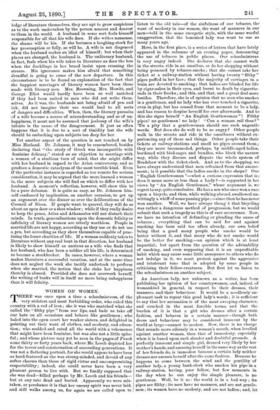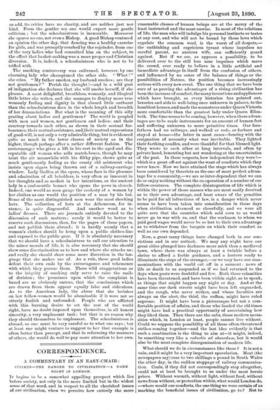WOMEN ON WOMEN.
THERE was once upon a time a schoolmistress, of the very strictest and most forbidding order, who ruled this country with a rod of iron ; she it was who snatched what she called the "filthy pipe" from our lips, and bade us take off cur hats on all occasions and behave like gentlemen ; who haled into the open court her weaker sisters, and delighted in pointing out their. want of clothes, and modesty, and educa- tion; who scolded and rated all the world with a vehemence that might have been feminine, but was also not a little spite- ful; and whose picture may yet be seen in the pages of Punch some thirty or forty years back, where Mr. Leech depicted her for the terror and consternation of succeeding generations. It was not a flattering portrait, for she would appear to have been as hard-featured as she was strong-minded, and devoid of any softer charms than those of rigid virtue and uncompromising respectability ; indeed, she could never have been a very pleasant person to live with. But we fondly supposed that she was dead—killed perhaps by Mr. Leech and his friends— but at any rate dead and buried. Apparently we were mis- taken, or perchance it is that her uneasy spirit was never laid, and still walks among us, for again we are called upon to
listen to the old tale—of the sinfulness of our tobacco, the want of modesty in our women, the want of manners in our men—told in the same energetic style, with the same woeful exaggeration, that the lamented lady was wont to use so many years ago.
Here, in the first place, is a series of letters that have lately appeared in the columns of an evening paper, denouncing the use of tobacco in public places. Our schoolmistress is very angry indeed. She declares that she cannot walk in the streets, ride in an omnibus, or do her shopping without being poisoned by tobacco-smoke ; that she cannot take her ticket at a railway-station without having twenty " filthy " pipes puffed in her face ; that the majority of carriages in a train are devoted to smoking; that ladies are blinded for life by cigar-ashes in their eyes, and burnt to death by cigarette- ends in their frocks ; and this, and that, and a great deal more besides. Therefore, she is of opinion that no man who smokes is a gentleman, and no lady who has ever touched a cigarette, even in play, but has ceased from that moment to be a lady, and has reason to despise herself for ever afterwards. And to this she signs herself "An English Gentlewoman " ! Filthy pipes ! no gentleman ! no lady ! "Can a woman rail thus ? " 'Tis a pity that a gentlewoman should use such tmgentle words. But does she do well to be so angry? Other people walk in the streets and ride in the omnibuses without ex- periencing any of these sad things. Other people take their tickets at railway-stations and smell no pipes around them ; they are more incommoded, perhaps, by middle-aged ladies, burdened with bird-cages and bundles, who block the narrow way, while they discuss and dispute the whole system of Bradshaw with the ticket-clerk. And as to the shopping, we have always understood that men refrained from that amuse- ment; is it possible that the ladies smoke in the shops P Our "English Gentlewoman "—what a curious expression that is ; does it mean more or less than a Lady P—is supported in her views by "An English Gentleman," whose argument is, we regret to say, quite conclusive. He has a son who once won a race upon a bicycle, and then, while walking abroad, swallowed un- wittingly a whiff of some passing pipe ;—since then he has never won another. Well, we have always thoug',t that bicycling was rather a dangerous method of progression, but we would submit that such a tragedy as this is of rare occurrence. Now, we have no intention of defending or pleading the cause of tobacco ; everything that can be said for and against smoking has been said too often already, our own belief being that a good many people who smoke would be better without it, and that many who do not smoke would be the better for smoking,—an opinion which is at least impartial ; but apart from the question of the advisability of smoking, and even supposing that it is an unprofitable habit which may cause some little annoyance to others who do not indulge in it, we must protest against the aggressive and intolerant tone that is adopted by some people in criticising their fellow-creatures. But first let us listen to the schoolmistress on another subject.
An American lady, not unknown as a writer, has been publishing her opinion of her countrywomen, and, indeed, of womankind in general, in respect to their dresses, their manners, and their behaviour. It would be a needlessly nn- pleasant task to repeat this good lady's words ; it is sufficient to say that her accusation is of the most sweeping character, and couched in the most forcible terms, and that the burden of it is that a girl who dresses after a certain fashion, and behaves in a certain manner—though both dress and behaviour may be considered innocent by the world at large—cannot be modest. Now, there is no charge that sounds more odiously in a woman's mouth, when levelled against another woman, than that of immodesty, especially when it is based upon such slender and doubtful grounds. A perfectly innocent and simple girl, dressed very likely by her mother's hands, and amusing herself in the same way as the rest of her friends do, is immodest because a certain lady neither dresses nor amuses herself after the same fashion. Because he happens to come between the wind and the gentility of another lady, a young bank-clerk who smokes his pipe in a railway-station, having, poor fellow, but few moments in the day when he can enjoy the simple pleasure, is no gentleman. Well, be it so : the world is in a bad way ; its pipes are filthy ; its men have no manners, and are not gentle- men ; its women have no modesty, and are not ladies ; and, let
us add, its critics have no charity, and are neither just nor kind. From the gentler sex one would expect more gentle criticism ; but the schoolmistress is inexorable. Moreover she spares no one, not even a Bishop. A good Bishop ventured an opinion the other day, that dancing was a healthy exercise for girls, and was promptly crushed by the rejoinder, from one of the very ladies who had consulted him on the subject, to the effect that basket-making was a more proper and Christian diversion. It is, indeed, a schoolmistress who is not to be trifled with.
The smoking controversy was enlivened, however, by one charming lady who championed the other side. " What ! " she cries. "My father smokes, my husband smokes ; are they not gentlemen ? " Perish the thought !—aid in a wild gust of indignation she declares that she will smoke herself, if she pleases. A most delightful, breathless, womanly, and illogical little letter she writes, and she manages to display more true womanly feeling and dignity in that absurd little outburst than the schoolmistress does in the whole length and breadth of her denunciations. But what is the meaning of this silly prating about ladies and gentlemen? The world is peopled with men and women, not gentlemen and ladies ; and their courtesy towards each other, as shown in their mutual for- bearance, their mutual assistance, and:their mutual expressions of good-will, is not only a very admirable thing, but is evidenced quite as much in the lower classes of society as in the higher, though perhaps after a rather different fashion. The eostermonger who gives a lift in his cart to the aged and dis- reputable old woman who sells match-boxes, though he may taint the air meanwhile with his filthy pipe, shows quite as much gentlemanly feeling as the crusty old aristocrat who insists upon cigars being thrown out of a railway-carriage window. Lady Godiva at the opera, whose face is the pleasure and admiration of all beholders, is very often as innocent in her thoughts and as modest in her intentions, as the ancient lady in a coal-scuttle bonnet who opens the pews in church. Indeed, one would as soon gauge the modesty of a woman by her clothes as one would the position of a man by his hat. Some of the most distinguished men wear the most shocking bats. The collection of hats at the Athenffum, for in- stance, is quite disgraceful. And another word as to ladies' dresses. There are journals entirely devoted to the discussion of such matters ; surely it would be better to reserve such discussions, then, for the pages of those papers, and not publish them abroad ; it is hardly seemly that a woman's clothes should be hung upon a public clothes-line and exposed to the public gaze. If it is absolutely necessary that we should have a schoolmistress to call our attention to the minor morals of life, it is also necessary that she should show some discrimination as to how and where she attacks us ; and really she should show some more discretion in the lan- guage that she makes use of. As a rule, these good ladies defeat their own ends by the extravagance and vehemence with which they pursue them. These wild exaggerations as to the iniquity of smoking only serve to raise the smile of derision ; the premisses upon which the complaint is based are so obviously untrue, that the conclusions which are drawn from them appear equally false and ridiculous. As to the American lady, the abuse that she lavishes on her fellow-women would be abominable if it were not so utterly foolish and unfounded. People who are afflicted with this burning desire to set the rest of the world right, have no doubt imposed upon themselves, in all honest sincerity, a very unpleasant task ; but that is no reason why they should themselves be unpleasant. The schoolmistress is abroad, so one must be very careful as to what one says ; but at least one might venture to suggest to her that example is often better than precept, and that in reforming the manners of others, she would do well to pay more attention to her own.



































 Previous page
Previous page